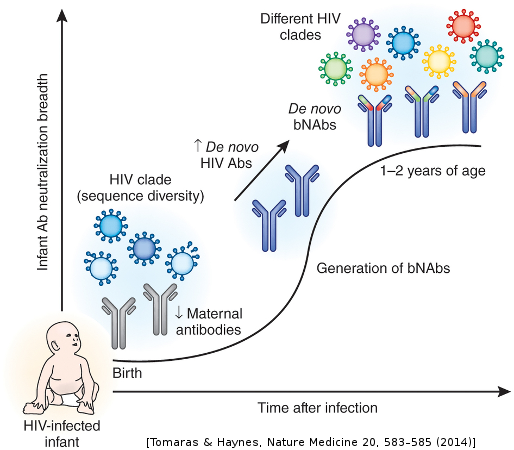 Although we have recently made a hire in this area, we continue to look for good people to work on this and related projects.
Although we have recently made a hire in this area, we continue to look for good people to work on this and related projects.
Our adaptive immune systems continually update themselves to neutralize and destroy pathogens. The receptor sequences of antibody-making B cells undergo a Darwinian process of mutation and selection which improves their binding to antigen.1 It is now possible to sequence these B cell receptors (BCRs) in high throughput, giving a profound new perspective on how the immune system responds to infection.2 Although the elements of B cell affinity maturation are the same as molecular evolution in other settings, being based on recombination, point mutation, and selection, there are a many important differences. These differences, along with the volume of sequence data available, bring new challenges for phylogenetics and molecular evolution.
The translational medical consequences of improved methods will be significant. Improved methods will especially help in understanding the development of broadly neutralizing antibodies against HIV. The current best hope for an effective HIV vaccine is to try to elicit such antibodies, but in order to do so we need to understand in detail how such antibodies. However, the effective antibodies naturally produced in adults require many years of mutation from an unlikely starting point. Thus they will be exceedingly difficult to elicit with a vaccine.
Fortunately, Julie Overbaugh’s group here at the Fred Hutch recently published a landmark paper, in which they found broadly neutralizing antibodies in HIV-positive infants. These antibodies mature in significantly less time than in adults (above graphic from a News & Views about the paper). The maturation pathway of these antibodies is not yet understood.
This open postdoc position is to develop new methods for B cell receptor sequence analysis and apply them to sequences from the Overbaugh lab infant study. Our group is dedicated to bringing modern model-based statistical3 molecular evolution and phylogenetics approaches to BCR sequence analysis that scale to large data sets. Thus far we have developed means of doing selection inference on B cell receptors, VDJ annotation (in press, PLOS Comp Bio), and clonal family inference (paper out soon)). Having made progress in these arenas, we are now starting to improve phylogenetic methods for B cell receptors.
We would like someone who is strong in computational statistics and/or molecular evolution, but who is motivated by and engaged with the underlying biology, or someone who is strong in immunology but is interested in computational methods. There aren’t any formal requirements really, except the ability to be able to make things happen with data. The methods-development part of this postdoc will be joint with Trevor Bedford, Vladimir Minin, and Harlan Robins, co-founder of Adaptive Biotechnologies.
The position will come with a competitive postdoc-level salary with great benefits for two years. There is some possibility of extension. Fred Hutchinson Cancer Research Center, home of about 190 faculty including three Nobel laureates, is an independent, nonprofit research institution dedicated to the development and advancement of biomedical research. The environment is lively yet casual, with a strong emphasis on collaborative work. The Center is housed in a lovely campus next to Lake Union a short walk from downtown, and a slightly longer walk from the University of Washington. Powerful computing resources and a helpful IT staff await.
If you are interested in this position, please send Erick some representative publications, code samples, and a CV.
If you are interested more in evolutionary dynamics of B cells please see the related opening on Trevor’s website.
-
Here model-based means that our ideas about how the system works are formalized into a probabilistic model, and statistical inference means that uncertainty at every stage is pushed through to obtain parameter estimates with appropriate statements of confidence in those estimates. ↩